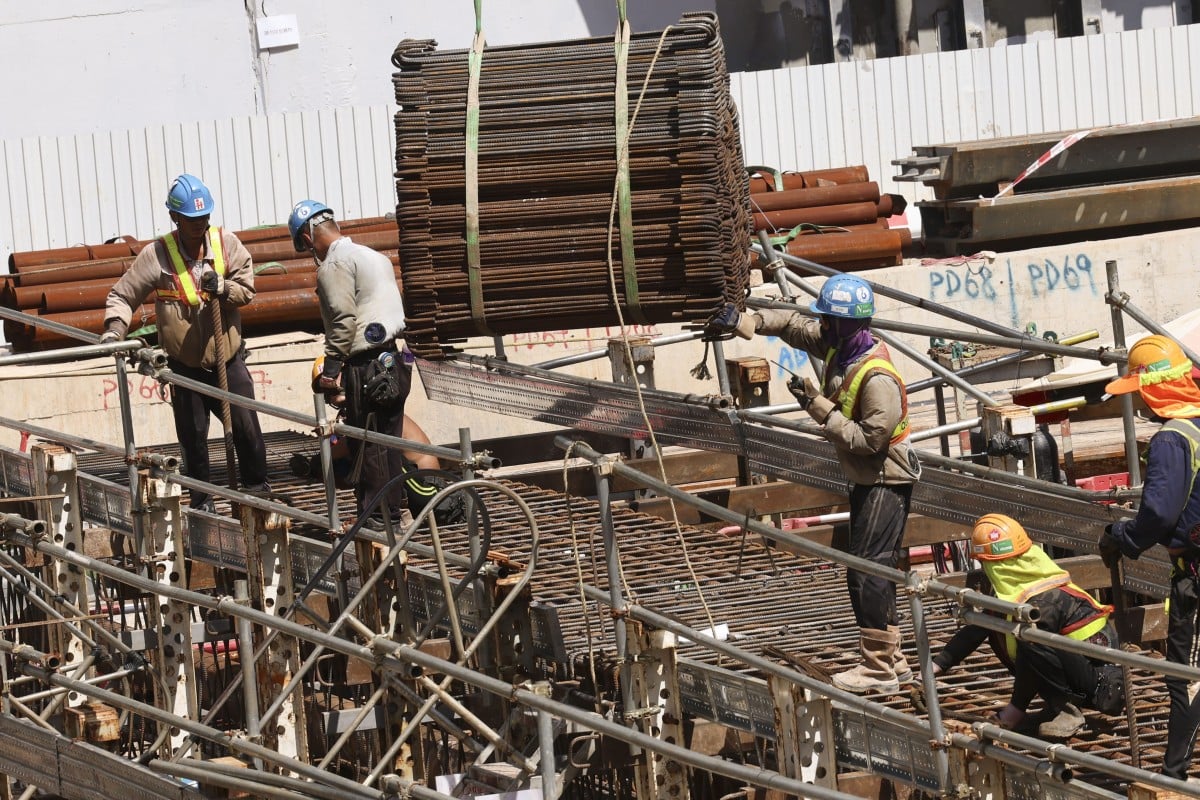 Hong Kong’s construction fatalities are rising, prompting calls for better safety measures and stricter penalties for offenders to address systemic issues. Photo: Jelly Tse
Hong Kong’s construction fatalities are rising, prompting calls for better safety measures and stricter penalties for offenders to address systemic issues. Photo: Jelly TseBefore you read: The city’s fatality rate among construction workers increased from 0.093 per 1,000 workers in 2016 to 0.178 last year. Labour rights advocates say the industry needs to prioritise safety instead of cutting costs
Think about it: According to Fay Siu Sin-man, what are the systemic problems behind these worker deaths? To what extent do you agree with her criticism?
Hong Kong recorded four fatal work accidents between November 5 and 12. In response, labour rights advocates are calling for employers and authorities to fix systemic problems, including poor safety measures, unreasonably low tender prices, lenient punishments for offenders and a flawed subcontracting system.
At a press conference last week, four workers’ rights groups and the family of a victim of a fatal industrial accident expressed their grievances and concerns, hours after a 77-year-old male cleaner fell into the sea at the Stonecutters Island public cargo working area and drowned.
Colleagues found the man’s body floating in the sea at 8.45am. He was later certified dead at Princess Margaret Hospital in Kwai Chung. A postmortem examination will be carried out to ascertain the cause of death.
Hong Kong’s MTR urges commuters to stand still on escalators
It marked the fourth fatal work accident in a week. On November 5, a 44-year-old male worker fell from the top of an 11-storey factory building at To Kwa Wan while dismantling scaffolding.
Two days later, a 37-year-old male worker fell to his death from the sixth floor of the Terminal 2 concourse of Hong Kong International Airport. He reportedly lost his footing and fell to the fourth floor.
Later that week, another male worker, 41, died after being crushed by a falling cage lift suspected to have been caused by a machine malfunction at a residential project site in Tai Wai.
Systemic issues
Fay Siu Sin-man, chief executive of the Association for the Rights of Industrial Accident Victims, called the situation “alarming” and said the industry had long been plagued by systemic problems, including the process for awarding tenders and lenient punishments for offenders.
“The tender is always awarded to the one offering the lowest price. How much attention and resources are being given to safety?” she said. “Aren’t we prioritising money over safety?”
She also criticised tight work schedules, the practice of conducting multiple operations on the same site, and the use of substandard safety devices, saying they were all entrenched in the industry’s culture.
The multilayered subcontracting system was also to blame, she said, as it diluted safety measures.
“Currently, [the number of] subcontracting tiers could reach four or five. Reducing it to only two or three would be easier for the delivery of safety messages and more effective monitoring,” Siu said.
Representatives from the Federation of Hong Kong and Kowloon Labour Unions, Hong Kong Christian Industrial Committee and Hong Kong Dumper Truck Drivers Association also spoke about the urgency of improving workplace safety.
Ho Wing-yip, a veteran electrical and building services engineer, said it was alarming that the city’s fatality rate among construction workers had surged from 0.093 per 1,000 in 2016 to 0.178 last year.
Victims waiting for justice
Ken Chan, who lost his younger brother to an industrial accident in May 2022, was also present at the briefing. He said the authorities should review lenient punishments for offenders who neglected industrial safety.
Chan said his brother had fallen from a height when putting up scaffolding, but it took 1½ years after his death for his employer to be arrested.
The employer was found guilty of three charges under the Occupational Safety and Health Ordinance earlier this month and fined only HK$90,000 (US$11,600), Chan added.
The employer had told the court he was struggling financially and was allowed to pay the fine in 90 instalments over 7½ years, or HK$1,000 per instalment.
Hong Kong trams can be more dangerous than cars, experts warn
“This is a very generous sentence,” Chan said. “It’s hardly a punishment, it’s meaningless.”
Chan said his father, who was seeking compensation for his son, had died recently, and the family was still awaiting justice.
More than 100 people have lost their lives at work this year, including 11 from the construction industry, according to Siu’s association, which organised the briefing.
The SCMP has approached the Labour and Welfare Bureau for its response to the groups’ demands.
